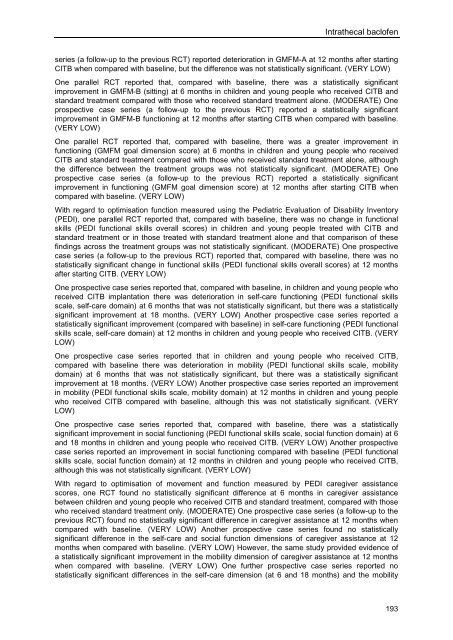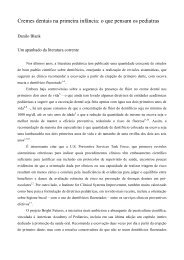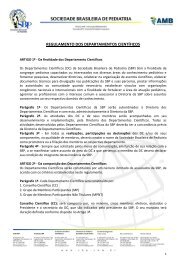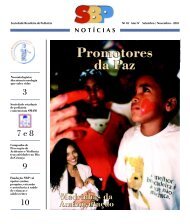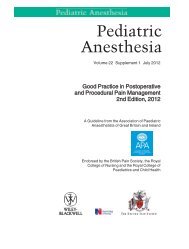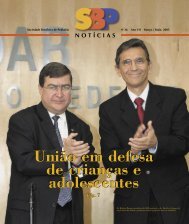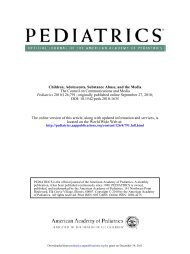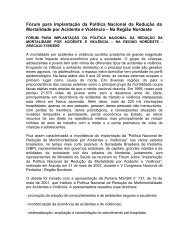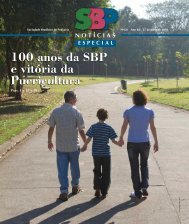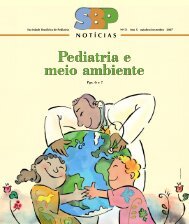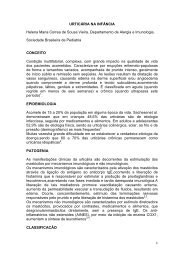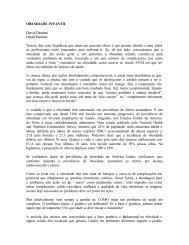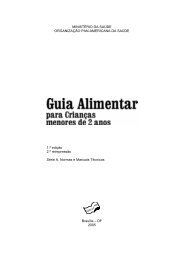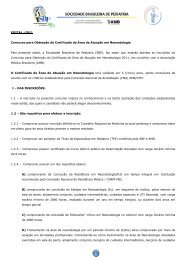National Collaborating Centre for Women's and Children's Health
National Collaborating Centre for Women's and Children's Health
National Collaborating Centre for Women's and Children's Health
Create successful ePaper yourself
Turn your PDF publications into a flip-book with our unique Google optimized e-Paper software.
Intrathecal baclofen<br />
series (a follow-up to the previous RCT) reported deterioration in GMFM-A at 12 months after starting<br />
CITB when compared with baseline, but the difference was not statistically significant. (VERY LOW)<br />
One parallel RCT reported that, compared with baseline, there was a statistically significant<br />
improvement in GMFM-B (sitting) at 6 months in children <strong>and</strong> young people who received CITB <strong>and</strong><br />
st<strong>and</strong>ard treatment compared with those who received st<strong>and</strong>ard treatment alone. (MODERATE) One<br />
prospective case series (a follow-up to the previous RCT) reported a statistically significant<br />
improvement in GMFM-B functioning at 12 months after starting CITB when compared with baseline.<br />
(VERY LOW)<br />
One parallel RCT reported that, compared with baseline, there was a greater improvement in<br />
functioning (GMFM goal dimension score) at 6 months in children <strong>and</strong> young people who received<br />
CITB <strong>and</strong> st<strong>and</strong>ard treatment compared with those who received st<strong>and</strong>ard treatment alone, although<br />
the difference between the treatment groups was not statistically significant. (MODERATE) One<br />
prospective case series (a follow-up to the previous RCT) reported a statistically significant<br />
improvement in functioning (GMFM goal dimension score) at 12 months after starting CITB when<br />
compared with baseline. (VERY LOW)<br />
With regard to optimisation function measured using the Pediatric Evaluation of Disability Inventory<br />
(PEDI), one parallel RCT reported that, compared with baseline, there was no change in functional<br />
skills (PEDI functional skills overall scores) in children <strong>and</strong> young people treated with CITB <strong>and</strong><br />
st<strong>and</strong>ard treatment or in those treated with st<strong>and</strong>ard treatment alone <strong>and</strong> that comparison of these<br />
findings across the treatment groups was not statistically significant. (MODERATE) One prospective<br />
case series (a follow-up to the previous RCT) reported that, compared with baseline, there was no<br />
statistically significant change in functional skills (PEDI functional skills overall scores) at 12 months<br />
after starting CITB. (VERY LOW)<br />
One prospective case series reported that, compared with baseline, in children <strong>and</strong> young people who<br />
received CITB implantation there was deterioration in self-care functioning (PEDI functional skills<br />
scale, self-care domain) at 6 months that was not statistically significant, but there was a statistically<br />
significant improvement at 18 months. (VERY LOW) Another prospective case series reported a<br />
statistically significant improvement (compared with baseline) in self-care functioning (PEDI functional<br />
skills scale, self-care domain) at 12 months in children <strong>and</strong> young people who received CITB. (VERY<br />
LOW)<br />
One prospective case series reported that in children <strong>and</strong> young people who received CITB,<br />
compared with baseline there was deterioration in mobility (PEDI functional skills scale, mobility<br />
domain) at 6 months that was not statistically significant, but there was a statistically significant<br />
improvement at 18 months. (VERY LOW) Another prospective case series reported an improvement<br />
in mobility (PEDI functional skills scale, mobility domain) at 12 months in children <strong>and</strong> young people<br />
who received CITB compared with baseline, although this was not statistically significant. (VERY<br />
LOW)<br />
One prospective case series reported that, compared with baseline, there was a statistically<br />
significant improvement in social functioning (PEDI functional skills scale, social function domain) at 6<br />
<strong>and</strong> 18 months in children <strong>and</strong> young people who received CITB. (VERY LOW) Another prospective<br />
case series reported an improvement in social functioning compared with baseline (PEDI functional<br />
skills scale, social function domain) at 12 months in children <strong>and</strong> young people who received CITB,<br />
although this was not statistically significant. (VERY LOW)<br />
With regard to optimisation of movement <strong>and</strong> function measured by PEDI caregiver assistance<br />
scores, one RCT found no statistically significant difference at 6 months in caregiver assistance<br />
between children <strong>and</strong> young people who received CITB <strong>and</strong> st<strong>and</strong>ard treatment, compared with those<br />
who received st<strong>and</strong>ard treatment only. (MODERATE) One prospective case series (a follow-up to the<br />
previous RCT) found no statistically significant difference in caregiver assistance at 12 months when<br />
compared with baseline. (VERY LOW) Another prospective case series found no statistically<br />
significant difference in the self-care <strong>and</strong> social function dimensions of caregiver assistance at 12<br />
months when compared with baseline. (VERY LOW) However, the same study provided evidence of<br />
a statistically significant improvement in the mobility dimension of caregiver assistance at 12 months<br />
when compared with baseline. (VERY LOW) One further prospective case series reported no<br />
statistically significant differences in the self-care dimension (at 6 <strong>and</strong> 18 months) <strong>and</strong> the mobility<br />
193


